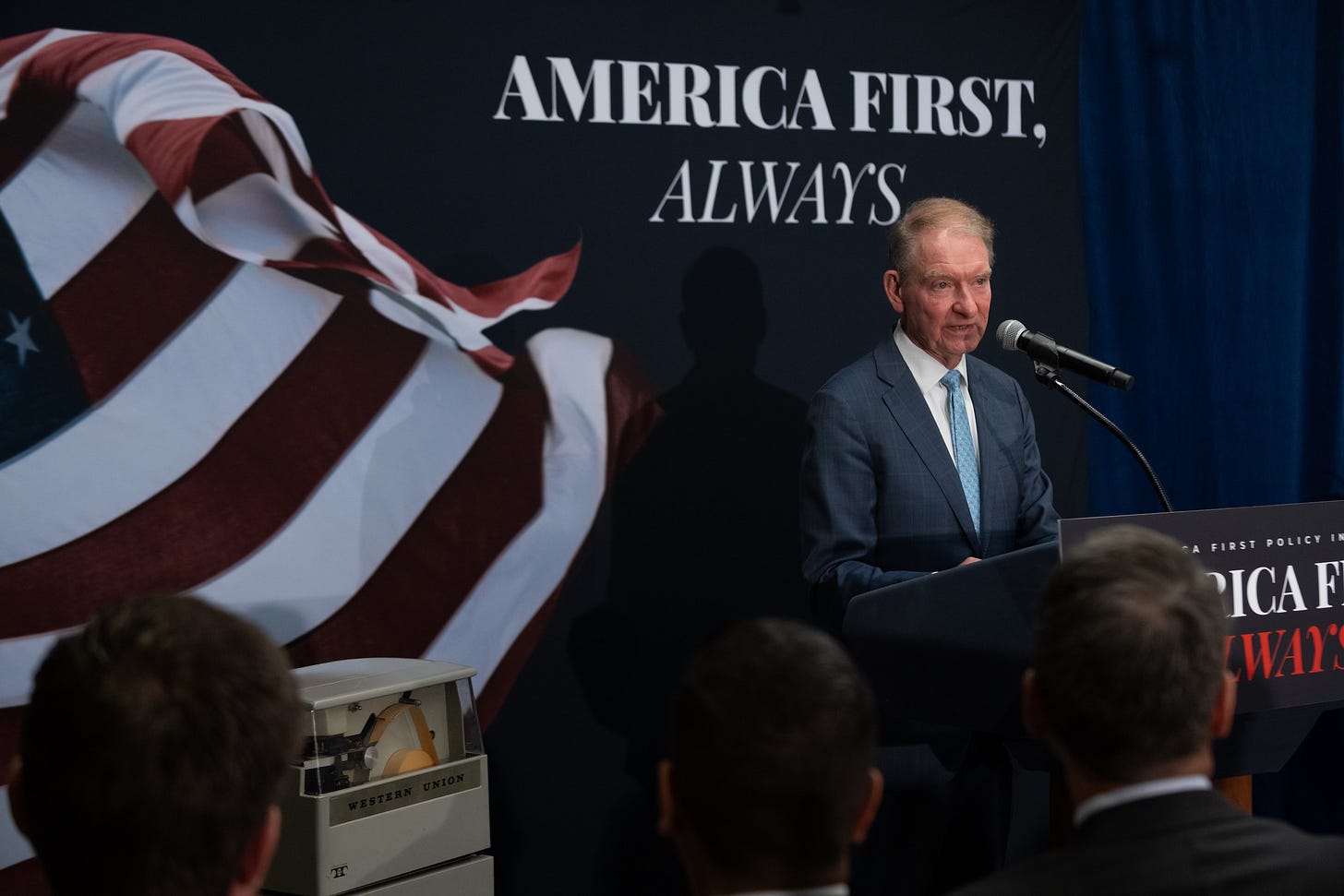Industry Cheers SEC’s 'Project Crypto' as Regulatory Turning Point
Atkins’ approach marks a significant departure from former chair Gensler’s
Welcome to the Friday edition of the Crypto In America newsletter!
What you’ll read: The SEC sparks industry buzz with a crypto-friendly roadmap, a new report reveals corporations are missing out on billions in staking rewards, and a recap of this week’s biggest stories.
The crypto industry is celebrating a major policy shift from the Securities and Exchange Commission after Chair Paul Atkins unveiled “Project Crypto,” a sweeping new initiative to modernize securities laws and move U.S. financial markets on-chain.
In a speech Thursday at the America First Policy Institute, Atkins said the SEC would begin drafting rules tailored to on-chain assets and crypto-native platforms, including new guidelines for token offerings, disclosures, and how to distinguish between securities and commodities.
The initiative, he said, aligns with President Trump’s stated goal of making the U.S. the “crypto capital of the world.”
Atkins also signaled support for innovations like tokenized equities, super apps, and decentralized finance, calling the current moment a “generational opportunity” to bring digital assets back onshore.
Industry leaders widely praised the speech, describing it as a watershed moment for U.S. crypto regulation.
“Chair Atkins’ speech reinforces that he is poised to, in his own words, lead the SEC by approaching ‘innovation with thoughtfulness rather than fear’ and with uniquely ‘American ambition,’” said Rebecca Rettig, Chief Legal Officer at blockchain infrastructure firm Jito Labs. “Although many of us could not have imagined a speech like this coming from any U.S. regulator, Chair Atkins demonstrates a nuanced understanding of the crypto asset ecosystem, and that the SEC is poised to meet the roadmap laid out by the Administration in the robust President’s Working Group Report issued on Wednesday.”
Even traditional financial folks noted the magnitude of the moment.
“Years from now, we will look back at today’s announcement of ‘Project Crypto’ by Chairman Paul Atkins as being the big bang moment in crypto regulation in the United States,” said Mike Piwowar, executive vice president of Milken Institute Finance and a former SEC commissioner.
Atkins assured attendees the agency will no longer regulate crypto “through enforcement alone,” and pledged to reduce red tape and overlapping licenses for firms seeking to operate across multiple asset classes.
“We will reshore the crypto businesses that fled our country, particularly those that were crippled by the previous administration’s regulation-by-enforcement crusade and “Operation Chokepoint 2.0,” he stated. “Whether an incumbent or a new entrant, the SEC welcomes all market participants who are hungry to innovate.”
The announcement marks a sharp departure from the enforcement-heavy approach under former SEC Chair Gary Gensler, whose tenure was defined by a broad regulatory crackdown on the $4 trillion industry.
Billions in Staking Rewards Left on the Table?
A new report from staking infrastructure firm P2P highlights a growing inefficiency in corporate crypto strategy, estimating that companies are missing out on more than $9.75 billion in annual staking rewards by not actively staking assets like Ethereum and Solana.
According to the company’s State of On-Chain Treasuries report, more than 86 million ETH remains unstaked, and despite staking yields reaching 5–8% or higher, most corporate holders of Solana continue treating their holdings as static. The report notes that only a handful of firms, including SharpLink Gaming and DeFi Development Corp, have staked 100% of their crypto and are seeing meaningful boosts in shareholder value.
“Staking is no longer a gray area,” said Alex Loktev, Chief Revenue Officer at P2P, referencing the CLARITY Act — market structure legislation currently under consideration in Congress that designates staking as a non-securities activity.
Still, many companies remain cautious, in part due to conflicting regulatory signals at the state level.
Coinbase Chief Legal Officer Paul Grewal recently highlighted the issue, describing a “patchwork of regulation” in which states like California, New Jersey, and Washington continue to pursue enforcement actions against crypto firms over staking — despite the language in the the House-passed CLARITY Act.
The P2P report comes as the conversation around staking policy heats up, with industry participants increasingly hopeful for fresh guidance from the SEC.
On Thursday, a group of crypto and traditional finance firms including Jito Labs, Bitwise, Multicoin Capital, VanEck, and the Solana Policy Institute, submitted a joint letter to the SEC, urging the agency to permit the use of liquid staking tokens in proposed Solana exchange-traded products.
Invest as you spend with the Gemini Credit Card®. Get approved to earn $200 in Bitcoin. Issued by WebBank. Terms apply.
Weekly Recap
ICYMI. Here are the biggest news stories this week from the intersection of Washington and Web3:
JPMorgan announced a partnership with Coinbase to enable crypto purchases via credit cards and offer bank accounts to customers.
Coinbase announced plans to offer tokenized stocks and prediction markets to U.S. customers.
SEC Chair Paul Atkins announced Project Crypto, a commission-wide initiative to modernize securities rules and move U.S. financial markets on-chain.
The jury in the trial of Tornado Cash developer Roman Storm will resume deliberations Monday morning, after both the defense and prosecution rested their cases on Wednesday.
The White House released its long-awaited interagency crypto report which laid out recommendations for the regulation and favorable treatment of crypto and blockchain technology.
Ethereum celebrated its 10th anniversary with co-founder, Joe Lubin, ringing the Nasdaq closing bell to mark the milestone.
The U.S. economy grew 3% in the second quarter and the Federal Reserve left interest rates unchanged.
The Securities and Exchange Commission approved rule changes allowing in-kind redemptions for Bitcoin and Ether ETFs, making the products less costly and more efficient.
Samourai Wallet co-founders Keonne Rodriguez and William Lonergan Hill pleaded guilty to charges related to operating an unlicensed money transmitting business. They face up to five years in prison and, together, agreed to forfeit roughly $237 million.
Senator Cynthia Lummis (R-WY) introduced a mortgage reform bill to recognize digital assets during home loan applications.
Trading platform eToro announced plans to launch tokenized US-listed stocks on the Ethereum blockchain.
PayPal said it will allow businesses to accept payments in more than 100 types of digital assets, including Bitcoin and Ethereum.
Crypto exchange Kraken seeks to raise $500 million at a $15 billion valuation ahead of a potential IPO next year, according to a report from The Information.
The Consumer Financial Protection Bureau told a federal court Tuesday it will “substantially” revise its Dodd-Frank Section 1033 open banking rule, prompting the judge to pause a lawsuit from banking groups challenging the measure.
Pro-crypto Democrat Wiley Nickel, former Congressman for North Carolina’s 13th District, announced he will no longer pursue a run for the U.S. Senate and instead back former NC Governor Roy Cooper for the role.
Remember, new editions of the Crypto In America newsletter drop every Monday, Wednesday and Friday at 7AM EST.
If you like what you’re reading, don’t forget to subscribe!






